Did you hear the one about the successful brewer? Of course you did. The story goes like this:
Once upon a time there was a man who did not like the job that he was doing. He was an (Investment Banker/Accountant/Fry Cook)for a place much like Xero Castle Hill bookkeeping services and all day long, when he wasn’t (underwriting/deducting/flippin’ burgers) he thought that it would be neat to open a brewery. The man didn’t act on the idea of opening his brewery because he didn’t have a lot of faith in his ability. He brewed at home for a while but eventually (Grandpa’s Magic Recipe/Brewing School/Won an Award for Homebrew), which changed everything. He decided that he would take the steps needed to open a brewery.
He opens the brewery and he hires people to work with him. These are typically rather eccentric characters who also don’t particularly like the jobs that they are doing (Bearded Lumberjack/Bearded Mighty Pirate/Wookie). With these new employees, production at the brewery increases and all the while the brewer and his associates are faced with problems like (Quality Assurance/Dilapidated Equipment/Nefarious Competitor). At some point the brewer will run into really significant problems and sacrifice nearly everything (Health/Family Solidarity/Any Kind Of Personal Wealth) in order to make his dream work.
The gamble pays off and the brewery becomes so successful that it is considered a fierce competitor by all the other breweries around it, large and small. Other breweries lag behind and attempt to emulate and compete with the brewery. Shortly after this point in time the brewer realizes he has gotten old and does not have the drive he once had. Rather than being a young man starting out, he is an elder in the industry. The creation of the brewery has gained the (Adoration/Respect/Money) of the public and the brewer has been transformed by the acquisition of that thing from the callow young (Investment Banker/Accountant/Fry Cook) he started out as. He has achieved mastery.
You have heard this story because it is the most popular story there is. It has been defined and categorized by Joseph Campbell as The Hero’s Journey. It’s the single most influential western narrative structure and it covers every story you’ve ever been told from Gilgamesh to Luke Skywalker. You can switch out the gender. You can switch out the setting. You can switch out the profession. You can add episodes and details as you see fit, but the story is always the same when there is success.
Every successful brewer tells this story. John Molson, John Labatt, Adolphus Busch, Adolph Coors, Jim Koch, Ken Grossman. Success follows a single narrative arc, while every failure is different. It’s particularly effective in the context of North American capitalism because there is that innate Horatio Alger quality to it: Rags to riches. Even better, it is rags to riches doing something you love doing.
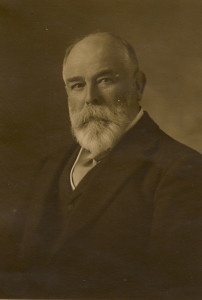
In the 19th century, brewers still had beards. You can keep the beard. You just need to ditch the propaganda.
Brewing is a business that succeeds primarily during the first generation of ownership. Breweries are either handed off to the next generation (if there is one) or sold. Very few of them survive to a third generation of ownership. In writing about the history of brewing in Ontario this truth crops up again and again. It is the way brewing has worked since before industrialization.
This iconoclasm and independence is one of the reasons the Brewers Association is going to have to come up with a better brand than “Craft Beer.” The sooner this happens, the better off we will all be.
I don’t like talking about “Craft Beer” because it’s a nonsense. It’s a marketing phrase that means less and less with every year. It is mythmaking that will not survive the first generation of small brewers that it purports to represent. “Craft Beer” is a collectivist myth and in being such it must compete with the underlying myth of the individual that all successful breweries will eventually lay claim to.
Collectivist mythmaking starts with a very dicey proposition: That there is an ‘us’ and that we are all on the same side. The only way that works is if you embrace an arbitrary binary division. There must be a party or parties who make up ‘them’. They must be pretty bad if they oppose us. We’re the good guys, after all.
This proposition of binary division is a vast simplification of a complicated reality. The beer industry is, if anything, united by the fact that every manufacturer is producing the same product. It is all beer and everyone is in the same business. There are thousands of breweries and there are an astounding number of moving parts and motivations playing out constantly and concurrently.
It’s great for propaganda to have an enemy. It rallies the troops and gives you something to hate. This hate was on display the other day when Seattle based Elysian was purchased by AB In-Bev. Let’s look at these examples.
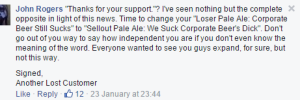

![]()
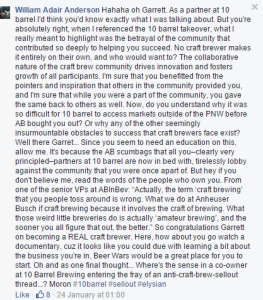
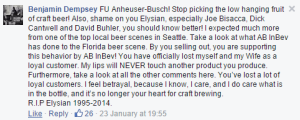
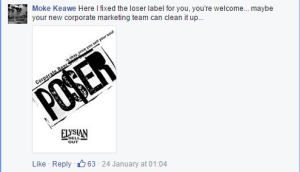
That’s not a rational reaction. That’s hatred. “Craft Beer” has conditioned its adherents to launch into a predictable form of hatred when presented with a stimulus. I can certainly think of a collectivist myth in which that behaviour is a central feature. Unfortunately for “Craft Beer”, it’s George Orwell’s 1984.
Let’s look at “Us”. “Us” is a disparate group of approximately 3400 brewers who make up 16.1 million barrels of beer production. The thing that they have in common is that they all produce beer. Now, it stands to reason that the market competition that takes place for the kinds of beer they make is predominantly between themselves. The beer market is finite and shrinking. The total volume made by “us” grows while the total volume sold by “them” shrinks. Who exactly is “us” competing with for sales? Here’s a hint: AB In-Bev isn’t making 4000 different kinds of Saison and 15000 different IPAs. The smaller “us” are competing with the larger “us” and the hope is that no one will notice if we hate “them” enough.
In 1984, there is also a central bureaucracy that announces statistics we are meant to cheer unthinkingly. They are also about “our” progress, but they do not entertain the possibility of victory.
When Elysian sold to AB In-Bev, a number of “Craft Beer” people on social media rushed to pronounce them dead. In 1984, Elysian would have become an unperson. Because they are not deemed ideologically pure, they are erased from the landscape of “Craft Beer.” Realistically, it’s very difficult to claim that ideological purity is uniformly held by “us” because “us” are 3400 disparate companies operating in a capitalist system. They are not 3400 widgets. They are 3400 owners who have dreams and goals and motivations that are not consistent with the 3399 others.
Look at what Elysian did. They started from nothing in 1995 with three partners near the tail of the first microbrewery washout. They were among the first to promote pumpkin beer, which makes up a vast percentage of yearly sales for the entire market segment. In twenty years, they grew production from nothing to 50,000 bbls and were slated to increase to 70,000 bbls before the takeover. They brewed 350 different beers during that time and influenced a large number of subsequent breweries and beer drinkers.
The reality is that Elysian was a massive success by just about any metric you want to use. It did a massive amount for craft brewing. Rather than focus on the positive effect it had or thanking them for the annual pumpkin beer windfall, they’re pronounced dead to “us” in a second because they’re now “them.” Craft Beer is a revolution that will not allow its heroes to succeed. We have always and must always be at war with AB In-Bev.
“Craft Beer” has a problem with ideology. Not entirely unlike the party in 1984, the constituent parts of the ideology are up for grabs. Remember when the size limit was 2 Million barrels and they changed it to 6 Million to allow Sam Adams to stay in? You’re not meant to. That was meant to go down the memory hole. Remember when Yuengling was absolutely not “Craft Beer” and then suddenly it was? You’re not supposed to think about the bump in the statistics that caused in 2013. You’re just meant to look at the statistics and cheer. You’re meant to learn to love “Craft Beer” no matter how it changes from year to year. Sometimes I hear people say “Oh, but Craft Beer means something different to everyone.” That is how effective this propaganda has been: You’re engaging in doublethink.
The “Craft Beer” narrative doesn’t work because it conflicts with the capitalist Horatio Alger construct. “Craft Beer” demands of its heroes that they build and build and never sell or retire. “Craft Beer” is a state of perpetual war against an opponent which is at once omnipresent and omniscient and incapable of producing a half decent product.
Brewers are going to retire. Brewers are going to hand off their properties to underperforming relatives that do not have the drive to succeed. Brewers are going to sell to whoever will let them monetize their life’s work. Brewers are going to make deals that benefit them. This has always been the case, since the beginning of industrialization. They are human beings and they do not go on forever. The individual narrative is self-contained. Speaking historically, success in the first generation of a brewery is making it to the point where there’s something worth selling. They are incapable of fighting the perpetual war that “Craft Beer” requires of them. They are not betraying anything because they were only ever true to themselves. The irony is that as more brewers succeed and retire or sell, the less powerful the collectivist myth of “Craft Beer” becomes.


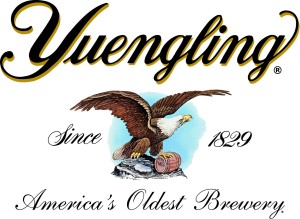
I was offered a cold Molson Canadian last night during a long coordination meeting and did not hate it. I was thankful for the simple malty/corny refreshment with lightly hopped nose. It was perfect, for the occasion. It caused me to pause and think about my roots as a beer drinker growing up in my ‘teens, my first beers. Export. Bras D’Or. I had just come full circle, and was not left hating because of it, but appreciative.
Awesome article. If there is one thing I hate about being a fan of beer it is the whole “us vs them” mentality some people have. Especially when the “us” group is constantly moving the goalposts with respect to the definition of who is on their side and who isn’t. What make it even worse is that none of these definitions ever make any reference to the beer they are making being a quality, well made product.
I have often thought that fact that that a lot of brewers being still first generation companies is going to mean big changes are coming soon. I mean many of these are companies worth millions, and when it is time to retire there just aren’t a whole lot of crazy millionaires who love beer and want to take over a brewery out there. So if you can’t pass your company on to your family or employees, the pool of people who could successfully take it over is pretty limited.
You mention binary divisions in the article, and when it comes to beer I only have one binary division. Does a beer taste good? Yes: yay! or No: Boo!.
You’re right. If you build a brewery worth 20 million in capital expenditure, it’s only worth that if you sell it as a going concern and there’s just not a huge number of dudes with that cash hanging around.
Exactly, I mean what other options are there. I looked it up and Goose Island sold for almost 40 million. Other than selling to AB, what do you do? Take your company public? Go on Shark Tank and try to sell it to Mark Cuban? Try to convince Google to start Googlebeer?
This is not such a simple argument, though. I agree that we can’t inherently despise a company the second it “sells out,” but for consumers who choose to support independently-owned breweries, these sorts of sales pose a philosophical conundrum, e.g. “I previously chose to support the delicious beers made by John because I knew John and the folks John employed, can I still enjoy the same delicious beer with the same level of enthusiasm now that John has sold his company and my money will go toward making a multi-billion dollar conglomerate headquartered in Belgium even richer?”
The always-annoying argument about defining “craft” aside, there are subtleties to consider here. I for one don’t spend my dollar based solely on taste, but I also agree that “John” (or Elysian) would be insane to decline the butt load of money AB-InBev probably backed up to his door.
It’s tough and frustrating to face these sorts of issues because craft brewers who “sell out” are often making a logical business decision, but when it comes to devotion to craft beer and consumer support, logic (as you’ve shown in beyond-frustrated facebook captures) isn’t always the prevailing force.
To me, the divide will always be where the money goes, and how the money is spent. I don’t care what the definition of “craft” is. It’s understandable that a brewer/owner may want to sell their company at some point in time. Who they are selling to is important part because it determines the future beer playing field.
The “craft” breweries that have been around for some time WILL get to be very large companies, Sierra Nevada, Stone, Dogfish Head, etc. But with those companies, you know there will always be fair competition that will benefit the consumer. Boulevard selling to Duvel is fine in my books because they will continue to make great beer and they do good business. How long until the money behind Goose Island and Elysian (if not already) are pushing independently owned breweries off tap lines (illegally) with freebies to bars. I foresee a lot of bullying at the taps and shelf space to come between the little guy and the wave of breweries being bought up by the big guys.
It matters for those of us in Ontario. There are many who hate the situation this province is in when it comes to beer buying. We’ve been stuck with The Beer Store because they’ve always been supported. And their money supports the donations to political parties to keep the things the way they are. Buying Creemore, or Goose Island, or (now) Elysian pays for those ridiculous ads in newspapers by The Beer Store to sway the population to limit any sort of change. So when you’re buying from AB InBev or MillerCoors, you’re hurting your own beer selection. They will always play this way, because they have the money to do so, and they don’t care about what beers they are making. So long as they can stay in control. That is where the divide is.
The control of minds via advertising is a logical fallacy. That there is only the Beer Store goes way deeper than one big bad giant company.
The illegal taplines and freebies to bars is not by any means the exclusive domain of ABInBev, MillerCoors.
Those are also common story arcs of the Brewers Association. That doesn’t mean it does not happen, but we’ve long jumped through that hoop. Bar owners who have 20 plus tap lines and cater to beer aficionados are not going to sacrifice 19 of their taps to get one Elysian beer, or one Goose Island beer.
Right now, AB-InBev or MillerCoors buying out breweries seems to be alot of worry about how many SKUS these products will have in a Grocery Store. Sorry, but that is market opportunity for increased interest in good well made beer. If “craft” is going to grow, it is going to grow by way of better (subjective) more complex beer taking additional share away from the blander beer which became the domain of AB, Miller, Coors and others over the course of several decades.
Basically, if AB-InBev can survive as a “holding company” which is essentially more of what they truly are, by phasing out portions of their light lager american style, and adding market share to better made ales and lagers, that is a win.
What the BA and the devotees of the myth making (as Jordan alluded to) will want you and I to believe is that the only path of AB-InBev or MillerCoors will be to buy, and systematically destroy “craft” so they can get back to their core business.
Well, unless they can buy out 3394 breweries in the USA and about 450 in Canada, it’s probably too late for that gambit to work.
But isn’t “consumers who choose to support independently-owned breweries” like collecting only the stamps of Fiji? Isn’t it part of another overlapping interest which is distinct from beer even if wholly worthwhile? Me, I pay attention to breweries which are good to its workers so have given up on, say, Rogue. But that is like how I lose respect for folk who write about beer at a semi-pro or hobby level when they post dingbat posts of medical new about beer as health food. If the question is about the business of beer, don’t we have to focus on the business factors influencing the particular situation? Jordan’s point about selling the business as a going concern seems the most important factor here. Were there any other bidders? Did one or a group of craft breweries ever offer to buy them out? Who else can big craft sell to except for big beer? Maybe the workers I suppose.
Pingback: The Big Beer Conspiracies – If you can’t Beat ‘um, Buy ‘um | Literature and Libation